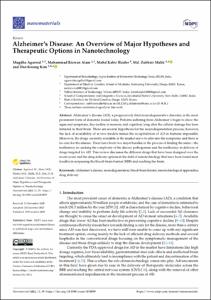KUMEL Repository
1. Journal Papers (연구논문)
1. School of Medicine (의과대학)
Dept. of Medical Genetics (의학유전학)
Alzheimer's Disease: An Overview of Major Hypotheses and Therapeutic Options in Nanotechnology
- Keimyung Author(s)
- Kim, Dae Kwang
- Department
- Dept. of Medical Genetics (의학유전학)
- Journal Title
- Nanomaterials (Basel)
- Issued Date
- 2021
- Volume
- 11
- Issue
- 1
- Keyword
- Alzheimer's disease; neurodegeneration; blood–brain barrier; nanotechnological approaches; drug delivery
- Abstract
- Alzheimer's disease (AD), a progressively fatal neurodegenerative disorder, is the most prominent form of dementia found today. Patients suffering from Alzheimer's begin to show the signs and symptoms, like decline in memory and cognition, long after the cellular damage has been initiated in their brain. There are several hypothesis for the neurodegeneration process; however, the lack of availability of in vivo models makes the recapitulation of AD in humans impossible. Moreover, the drugs currently available in the market serve to alleviate the symptoms and there is no cure for the disease. There have been two major hurdles in the process of finding the same—the inefficiency in cracking the complexity of the disease pathogenesis and the inefficiency in delivery of drugs targeted for AD. This review discusses the different drugs that have been designed over the recent years and the drug delivery options in the field of nanotechnology that have been found most feasible in surpassing the blood–brain barrier (BBB) and reaching the brain.
- Keimyung Author(s)(Kor)
- 김대광
- Publisher
- School of Medicine (의과대학)
- Citation
- Mugdha Agarwal et al. (2021). Alzheimer’s Disease: An Overview of Major Hypotheses and Therapeutic Options in Nanotechnology. Nanomaterials (Basel), 11(1), 59. doi: 10.3390/nano11010059
- Type
- Article
- ISSN
- 2079-4991
- Source
- https://www.mdpi.com/2079-4991/11/1/59
- Appears in Collections:
- 1. School of Medicine (의과대학) > Dept. of Medical Genetics (의학유전학)
- 파일 목록
-
-
Download
 oak-2020-0775.pdf
기타 데이터 / 1.49 MB / Adobe PDF
oak-2020-0775.pdf
기타 데이터 / 1.49 MB / Adobe PDF
-
Items in Repository are protected by copyright, with all rights reserved, unless otherwise indicated.